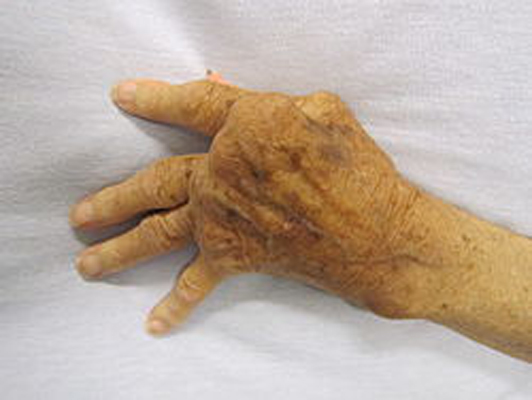
Scorpion venom component may treat rheumatoid arthritis:Study
New York, Feb 27 (IBNS): A treatment that improves the lives of nearly 1.3 million people with rheumatoid arthritis might one day originate from scorpion venom.
A group of researchers led by Dr. Christine Beeton at Baylor College of Medicine has found that one of the hundreds of components in scorpion venom can reduce the severity of the disease in animal models, without inducing side effects associated with similar treatments.
The study appears in the Journal of Pharmacology and Experimental Therapeutics.
“Rheumatoid arthritis is an autoimmune disease – one in which the immune system attacks its own body. In this case, it affects the joints,” said Beeton, associate professor of molecular physiology and biophysics and member of the Dan L Duncan Comprehensive Cancer Center at Baylor College of Medicine.
“Cells called fibroblast-like synoviocytes (FLS) play a major role in the disease. As they grow and move from joint to joint, they secrete products that damage the joints and attract immune cells that cause inflammation and pain. As damage progresses, the joints become enlarged and are unable to move.”
Current treatments target the immune cells involved in the disease and none are specific for FLS. Beeton and her colleagues studied FLS looking for an ‘Achilles’ heel’ that would allow them to prevent or stop them from damaging the joints.
“In previous work, we identified a potassium channel on FLS of patients with rheumatoid arthritis and found that the channel was very important for the development of the disease,” Beeton said. “We wanted to find a way to block the channel to stop the cells damaging the joints.”
Potassium channels work by opening gates on the surface of cells that allow potassium ions – small charged atoms – to flow in and out of the cell.
The flow of ions through the channels is necessary for the cells to carry out many of their essential functions. Animals such as scorpions have venoms that block potassium and other ion channels.
They use the venoms to paralyze and kill prey. Decades ago, scientists discovered this and realized that, if handled correctly, venoms also might have medicinal applications.
“Scorpion venom has hundreds of different components. One of the components in the venom of the scorpion called Buthus tamulus specifically blocks the potassium channel of FLS and not the channels in other cells such as those of the nervous system,” said first author Dr. Mark Tanner, a graduate student in the Beeton lab during the development of this project.
“Here, we investigated whether this venom component, called iberiotoxin, would be able to specifically block the FLS potassium channel and reduce the severity of the rheumatoid arthritis in rat models of the disease.”
When the researchers treated rat models of the disease with iberiotoxin, they stopped the progression of the disease. In some cases they reversed the signs of established disease, meaning that the animals had better joint mobility and less inflammation in their joints. In addition, treatment with iberiotoxin did not induce side effects, such as tremors and incontinence, observed when treating with another channel blocker called paxilline.
“It was very exciting to see that iberiotoxin is very specific for the potassium channel in FLS and that it did not seem to affect the channels in other types of cells, which might explain the lack of tremors and incontinence,” Tanner said.
“Although these results are promising, much more research needs to be conducted before we can use scorpion venom components to treat rheumatoid arthritis,” Beeton said. “We think that this venom component, iberiotoxin, can become the basis for developing a new treatment for rheumatoid arthritis in the future.”
Other contributors of this work include Michael W. Pennington, Brayden H. Chamberlain, Redwan Huq, Elizabeth J. Gehrmann, Teresina Laragione and Pércio S. Gulko. The contributors are affiliated with one or more of the following institutions: Baylor College of Medicine, Peptides International, Inc. and Icahn School of Medicine at Mount Sinai.
Image: Wikimedia Commons
Support Our Journalism
We cannot do without you.. your contribution supports unbiased journalism
IBNS is not driven by any ism- not wokeism, not racism, not skewed secularism, not hyper right-wing or left liberal ideals, nor by any hardline religious beliefs or hyper nationalism. We want to serve you good old objective news, as they are. We do not judge or preach. We let people decide for themselves. We only try to present factual and well-sourced news.







